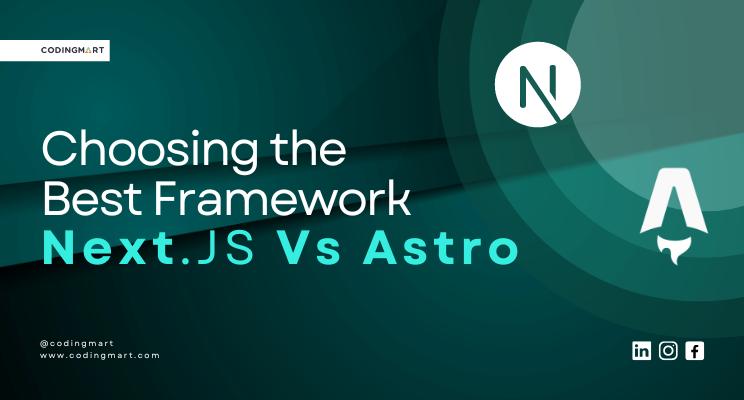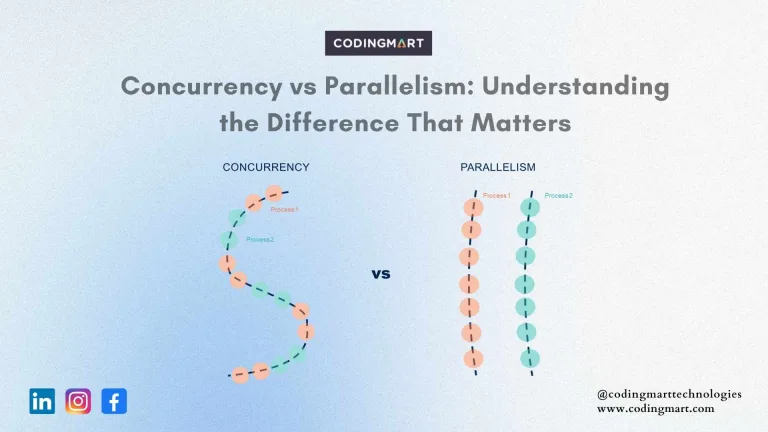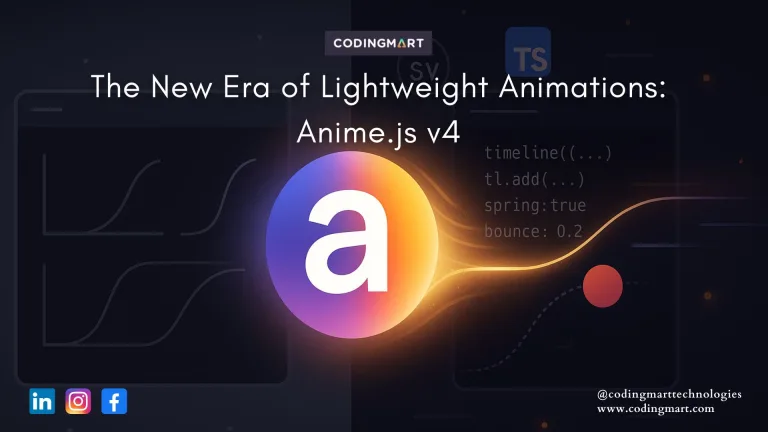blogs
Choosing Next.js vs Astro: Best Framework for Your Project

Exploring Next.js
Next.js, a well-known open-source framework built upon React, has become a preferred choice for developers aiming to effortlessly create server-rendered React applications. Its focus on hybrid rendering, automatic code splitting, and integrated API routes make it an appealing option for projects requiring both server-side rendering and static site generation capabilities.
Astro’s Innovation
In contrast, Astro, a newer and innovative static site generator, prioritizes delivering the fastest possible websites. It achieves this by utilizing partial hydration, supporting multiple frameworks, and incorporating built-in optimizations. This approach has made Astro a favorite among developers aiming to build high-performance static sites or sites with predominantly static content.
Comparing Next.js and Astro
Next, We are going to compare these two frameworks based on their features, use cases, and advantages. We will also provide examples to illustrate their strengths and weaknesses, enabling you to make an informed decision about which framework best suits your project. By the end of this read, you will possess a comprehensive understanding of both Next.js and Astro, empowering you to choose the ideal framework that aligns with your project’s requirements and desired outcomes.
Overview of Next.js
Next.js, a well-known open-source framework built upon React, has become a preferred choice for developers aiming to effortlessly create server-rendered React applications. Its key features include:
- Hybrid Rendering : Next.js supports both server-side rendering (SSR) and static site generation (SSG), providing flexibility in selecting the best rendering approach for each application page.
- Automatic Code Splitting : The framework enhances performance by dividing the code into smaller segments and loading them only as necessary, resulting in faster page loading times.
- API Routes : Next.js includes built-in support for API routes, simplifying the process of creating APIs alongside the web application.
- TypeScript Support : Next.js offers native TypeScript support, making it easy to introduce static typing to your project for enhanced reliability during development.
- Development and Production Optimization :Next.js optimizes applications for both development and production environments, including features like hot module replacement for seamless updates.
Astro’s Features
Astro, a newer static site generator, prioritizes ultra-fast websites through partial hydration, multi-framework compatibility, and automatic optimizations. Key features of Astro include :
- Partial Hydration : Astro transmits only the essential JavaScript required for site functionality, leading to quicker load times by avoiding unnecessary JavaScript loading.
- Multi-Framework Support : Astro enables the use of various web frameworks (e.g., React, Vue, Svelte) within a single project, enhancing development flexibility.
- Markdown Integration : Astro seamlessly integrates Markdown files, simplifying the creation of content-rich websites such as blogs or documentation.
- Built-in Optimizations : Astro automates performance optimizations such as HTML, CSS, and JavaScript minification, critical CSS inlining, and image lazy-loading.
- Versatile Rendering :Astro supports server-side rendering, client-side rendering, and static site generation, offering adaptable rendering approaches for different sections of your site.
Comparing Next.js and Astro Use Cases :
- Next.js : Suitable for applications demanding dynamic data or server-side rendering, such as e-commerce platforms, frequently updated blogs, or real-time data applications.
- Astro :Ideal for static websites or sites with predominantly static content, like blogs, documentation sites, or portfolios.
Performance :
- Next.js : Delivers solid performance through hybrid rendering and automatic code splitting, ensuring responsiveness and speed as applications grow.
- Astro :Focuses on maximum performance with partial hydration, built-in optimizations, and support for multiple frameworks, leading to faster load times and enhanced user experiences.
Learning Curve :
- Next.js : Requires familiarity with React and concepts like server-side rendering and static site generation, but benefits from comprehensive documentation and a large community.
- Astro :Easily grasped by developers acquainted with HTML, CSS, and JavaScript; might involve learning a new framework for those not familiar with the supported options.
Ecosystem and Community :
- Next.js : Boasts a thriving community and a diverse ecosystem of plugins and libraries, providing abundant resources for building applications.
- Astro :As a newer framework, its community is smaller but active, and the ecosystem is expanding as more developers adopt Astro.
Conclusion
Both Next.js and Astro offer valuable features and cater to different use cases. Next.js is suitable for dynamic applications with server-side rendering requirements, while Astro excels in creating high-performance static or mostly static sites.
To aid your decision-making, consider the following scenarios :
E-commerce Website : For real-time updates on product availability and pricing, choose Next.js due to its dynamic data handling and server-side rendering capabilities.
Blog or Portfolio : Opt for Astro when building content-rich static sites or sites with sections that require various frameworks, as it prioritizes performance and flexibility.
Ultimately, your choice between Next.js and Astro hinges on your project’s needs, your familiarity with the frameworks, and your preferences. Both frameworks have strengths that can help you construct successful web applications.
We hope this deep dive into Next.js and Astro has provided you with valuable insights into choosing the right web development framework for your projects. Remember, your selection should align with your project’s unique needs and goals. Whether it’s the dynamic capabilities of Next.js or the speed-focused performance of Astro, the world of web development is in your hands. Stay tuned for more informative content, and feel free to connect with us on LinkedIn for further discussions and updates. Until next time, happy coding!


